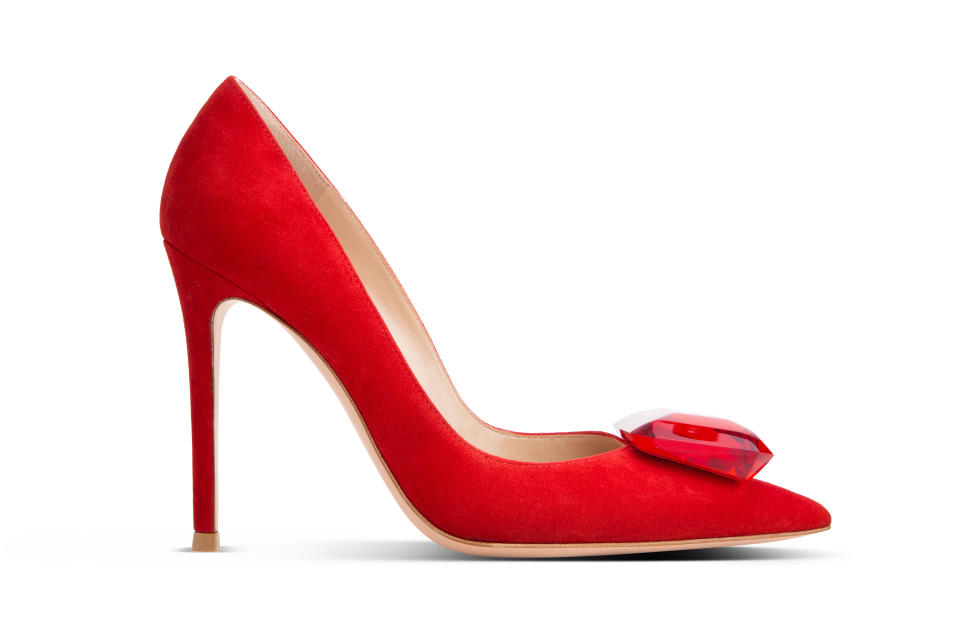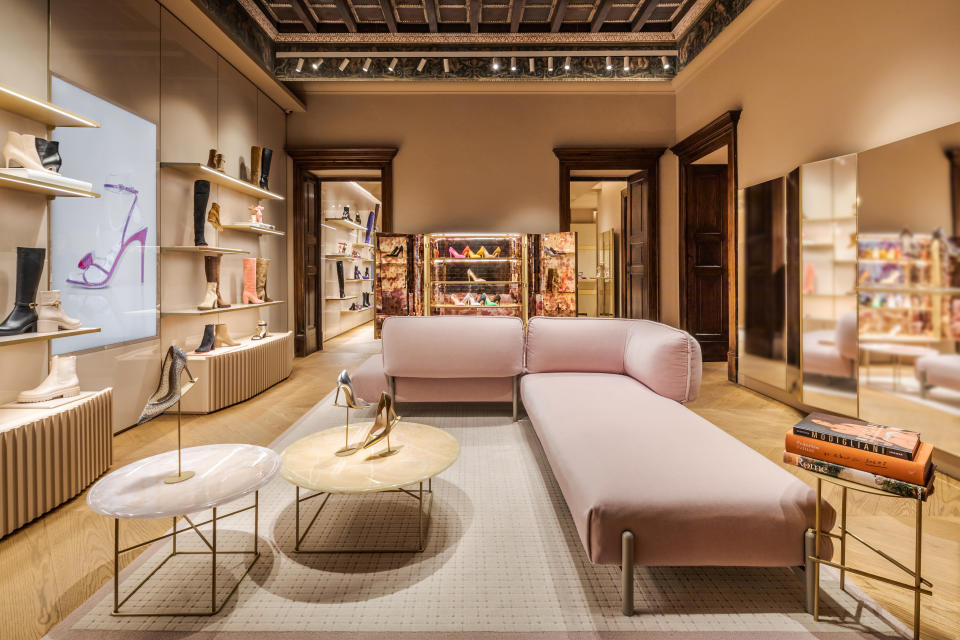Richemont Acquires Controlling Stake in Gianvito Rossi

PARIS — Step aside sneakers.
Signaling its confidence in classier, dressier footwear, Compagnie Financière Richemont has acquired a controlling stake in Gianvito Rossi, the Italian maker of sophisticated heels.
More from WWD
Tamara Mellon Joins Forces With Titan Industries to Expand Luxury Footwear Brand
Kid's Resale Marketplace The Swoondle Society Acquires ShopTomorrows
While casual and athletic shoes have been a principal focus for many big luxury brands in recent years, “we see that elegant footwear is going to be very strongly accelerating going forward,” Philippe Fortunato, chief executive officer of Richemont’s fashion and accessories maisons, told WWD in an exclusive interview.
He lauded the savoir-faire, unique level of taste, style and comfort Gianvito Rossi has been championing, and now transmitting to his daughter Sophia. “Richemont believes a lot in family development,” Fortunate stressed.
The Swiss luxury group, best known for its star brand Cartier, is also a believer in the “quiet luxury” trend that has been sweeping the market — and the potential for specialist shoe maisons.
“The high-end footwear market is going to be a very important frontier of development in luxury. We see fundamental trends on customers buying more and more shoes,” Fortunato said in a joint interview with Rossi.

Financial terms of the deal were not disclosed. Gianvito Rossi, who is founder, CEO and creative director, retains a stake in the company.
The transaction comes two years after Richemont snapped up elite Belgian handbag maker Delvaux, topping up its “other” business area, composed mainly of fashion and accessories brands. These include Montblanc, Chloé, Alaïa, Dunhill, Peter Millar, AZ Factory, Purdey and Serapian.
In the interview, Rossi cited intensifying competition in luxury, and a wish to devote more energies to designing and developing handmade shoes that are as “pleasant” to wear as they are to look at and hold as objects.
“I was looking for a partner that could help me create a retail network worldwide, at a very, very high level and offering great service to our clients,” he said.
Today the brand operates 36 boutiques in cities including Rome, Paris, Monte Carlo, London, New York, Miami, Los Angeles, Hong Kong, Tokyo, Seoul, Dubai, Doha, Beijing, Chongqing and Chengdu.

Fortunato noted that Richemont would be able to offer its real estate and retail expertise in fast-growing Asian markets, where Gianvito Rossi has only scratched the surface, and support the brand’s ominichannel development.
He also hinted at product expansion, with handbags and leather goods the first categories tackled.
Revenues at Gianvito Rossi came in a notch under 100 million euros in 2022, above pre-pandemic levels, according to market sources. It is understood the company is well managed and profitable.
Wholesale clients include Selfridges, Harvey Nichols, Bloomingdale’s, Nordstrom, Bergdorf Goodman and Net-a-porter.
Rossi founded his namesake brand in 2006 in San Mauro Pascoli, Italy, after spending years studying shoemaking under his footwear-guru father Sergio Rossi. He opened the first freestanding Gianvito Rossi store in Milan in 2008.
Richemont noted that the Gianvito Rossi transaction would have “no material financial impact” on its consolidated net assets or operating result for the year ending March 31, 2024.
In a research note, Barclays voiced some skepticism: “Although the deal could enable Richemont to develop a new expertise, we would prefer the group to focus on the hard luxury segment, which is where its strengths lie.”
Bernstein’s Luca Solca also had some trepidation. “We are not particularly keen on footwear brands, as their ability to expand from their core category is very limited — given their idiosyncratic appeal and relatively low absolute price point,” he wrote. “Yet, one could think that — like with Delvaux — Richemont is running a series of soft luxury experiments, ahead of possibly more meaningful forays.”
There are no immediate plans to leverage Gianvito Rossi’s production facilities for other Richemont brands, he noted. “How its expertise on shoemaking might benefit our other maisons, we will see later.
“I have the most immense respect for the skills and the savoir-faire of all the artisans,” he stressed. “The first support will be on expanding the distribution.”
For Rossi, the client remains his first priority, “to let her look better, and feel better,” he said.
While acknowledging intense competition in the luxury sector, and the market share gains megabrands have made in footwear, Rossi argued that to create “very high-end, handmade, properly made, soft and pleasant shoes to wear” requires deep know-how and artisanal techniques perfected over decades.
He said he has no immediate plans to relinquish the CEO role, but considers that his “second job” after being creative director.
“Obviously, the company will be more structured in the future. And for me it will be very important so I can be more focused on the work I love the most,” he said.
Earlier this month, Richemont reported revenues in the three months ended June 30 surged 14 percent to 5.32 billion euros, fueled by a strong rebound among Chinese tourists and locals.
Its three jewelry brands — Cartier, Van Cleef & Arpels and Buccellati — grew 24 percent during the three-month period, while sales in the watch division were up 10 percent. The company’s other brands division rose by 6 percent at constant exchange rates.
Richemont noted the Gianvito Rossi transaction “remains subject to certain customary conditions and regulatory approvals.”
Rothschild & Co. served as Gianvito Rossi’s adviser.
Best of WWD

